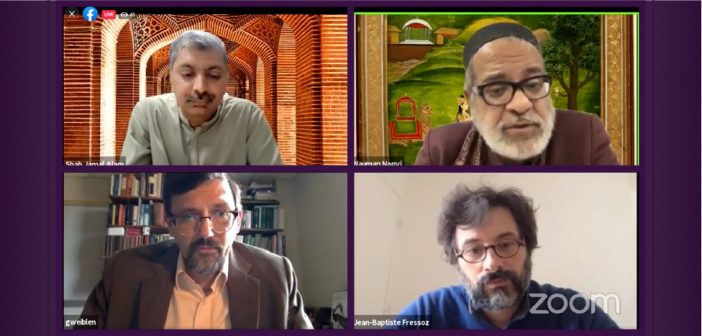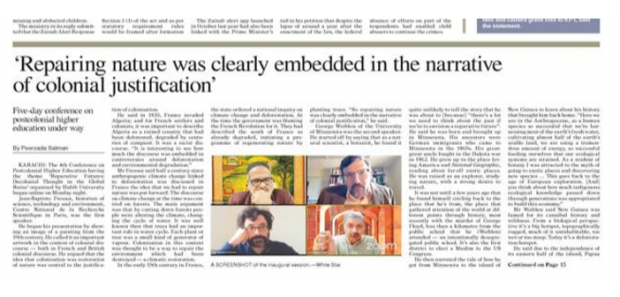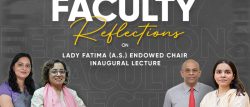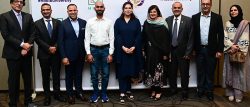The ecological catastrophe of the world has become a regular headline-grabber in the global news cycle, pushing us to ponder reparative plans for our future. But after centuries of exploitation and of ravaging the earth for resources to fuel our ambitions, there are questions on whether a repair is even possible.
The destruction of the biosphere was discussed in the first session of Habib University’s flagship Post-Colonial Higher Education Conference: ‘Decolonial Thought in the Global Ruins.’
The first session of the conference, ‘Repairing the Biosphere’ began with eminent panelists Professor Jean-Baptiste-Fressoz, an environmental historian from the Centre National de la Recherche Scientifique in Paris, and Dr. George Weiblen, the Science Director at the Bell Museum and a professor at the University of Minnesota.
Dr. Nauman Naqvi, an Associate Professor of Comparative Humanities in the School of Arts, Humanities and Social Sciences at Habib University and the chair of the fourth Post-Colonial Higher Education Conference (PHEC) set the context for the session.
“We live in a profoundly damaged world. The great acceleration of the Anthropocene has laid bare the extraordinary destruction and radical rumination that the world has experienced in the modern period,” are the words with which he explained the environmental predicament facing the world.
Dr. Shah Jamal Alam, Associate Professor at the Dhanani School of Science and Engineering (DSSE), was the moderator of this session. He added to the account of the Great Acceleration of the mid-20th century as a precursor of the damage that has been inflicted on the earth’s biosphere, the climate, and the ecosystem as a result of growing human activities.
He quoted from Fressoz’s book, “The Shock of the Anthropocene” (Italicize), saying, “the conclusion that forces itself upon us, disturbing us as it may be, is that our ancestors destroyed environments in full awareness of what they were doing.”
Professor Fressoz started his presentation by claiming that the entire premise for colonization was set around the restoration of destroyed nature by natives. He used the example of colonization of Algeria by his native France in 1830, to depict the significance of this idea: “for French settlers and colonists, it was important to describe Algeria as a country that had been destroyed environmentally and deforested.”
Watch the session
The discourse used in the process of invasion was inherently racist, he stated, adding that it was peculiar to see how much of this narrative was embedded in controversies around environmental degradation. Debates centring around ‘repairing nature’ were frequently discussed in the French public sphere. An idea that was put forward for centuries, centred exclusively on the issue of deforestation.
The main argument was that by cutting down forests, people were altering the climate and disturbing the water cycle. Soon, towards the late 18th century, arguments proliferated claiming that people were destroying nature and the climate. Colonization, in this context, was perceived as a ‘climactic restoration’.
In the early 19th century, the French government ordered a national inquiry on climate change and deforestation which was set up in 1820. This idea of repairing nature was put forward by foresters who published an entire journal on climate change and deforestation in 1822. The colonial narrative, Fressoz argued, is clearly orientalist, in Edward Said’s sense.
Discourse on the environment is deeply connected with political problems of the time, he continued. The main idea was that climate was already envisaged on a global scale.
An image depicting earth’s ‘sacred theory in the late 17th century,’ Fressoz argued, showed that climate was sought on the global scale because of natural theology.
This supplemented the idea that the earth was a connected system organized for the greater good. Thus, we did not enter the Anthropocene in a kind of blind modernity; the economy of nature has a long pedigree and heritage.
Fressoz argued that we entered the Anthropocene knowingly and in a manner to ‘depoliticize’ the narrative of the Anthropocene. Since the 2000s, he said that there has been a far too simplistic narrative revolving around the fact that humanity has been destroying the environment without being aware of it.
However, he suggested that we can shift this narrative around and enter a ‘good Anthropocene – one that is enlightened by knowledge and science. This is why the current discourse of the Anthropocene has been largely connected to geoengineering.
This is not a mere crisis, rather, it is a new geological revolution that gives us new responsibilities as humans, as a biological species. We have to give a proper story to the Anthropocene.
Fressoz went on to highlight that it is crucial to be aware of a proper history of the Anthropocene if we wish to even begin talking about possible solutions.
Professor George Weiblen began by walking through his journey as a botanist and explorer. He spoke about his time in Papua New Guinea, which he claims is one of the last places in the world with an indigenous population that experienced colonialism. During his time on the island nation notion of land rights in New Guinea interested Weiblen and he soon discovered the relationship between cultural and biological diversity.
He went on to inform that over 1,000 languages are spoken in New Guinea. Language extinction, he contended, is a more significant problem than the extinction of biological species. He explained that the loss of a language was essentially the loss of cultural knowledge. As an example, he pointed out how in Europe, 90 percent of the 250 languages are not spoken by children today.
Meanwhile, in Guinea, he said that there has been an incredible collision of cultures through the advent of technology and role of science.
“We should derive lessons from nature,” he argued, adding that diverse societies are more resilient, as in the case of Papua New Guinea. Moreover, when resources are limited, we need to try to live within them.
Lastly, we need to acknowledge change and live with it. Nature can guide this reparation because, as Professor Weiblan noted, “it’s the social, cultural and human connections that are absolutely critical, even more important than technology as tools to repair and envision a better future.”
During the question-and-answer part of the session, Dr. Shah Jamal Alam wondered if our role as “managers of nature” has made us arrogant and made the world appear similar to a system that we wish to get our hands-on.
Fressoz responded that such an idea is very modern, arguing that thinking of the world in such a way has not reduced our problems in any way. Professor Weiblen commented that models and systems fail sometimes. The hubris, he argued, that the natural sciences maintain is one of our biggest challenges.
“We benefit from being humble; there is always room for humility.”
To a question about bringing the human aspect into the narrative, Dr Weiblen argued that this issue goes back to decolonizing. There are a lot of racial and cultural issues that we have not reckoned with as we become so enamored with technology.
Fressoz added that more than the obsession with technology is the matter of producing electricity with zero carbon – this should be the main goal. We have to decarbonize but this process will take centuries, though he cautioned that we may have caused enough damage to the world that it may be beyond repair now.
The session mapped out a history of the Anthropocene, its implications, heralding with it possible solutions to amends all the while acknowledging that it encompasses much more than we already know. As a concluding remark, Dr. Weiblen added that dreaming about these possibilities gives us proof that there is an element of chance. He added, “There is no salvation in science.”
News coverage





